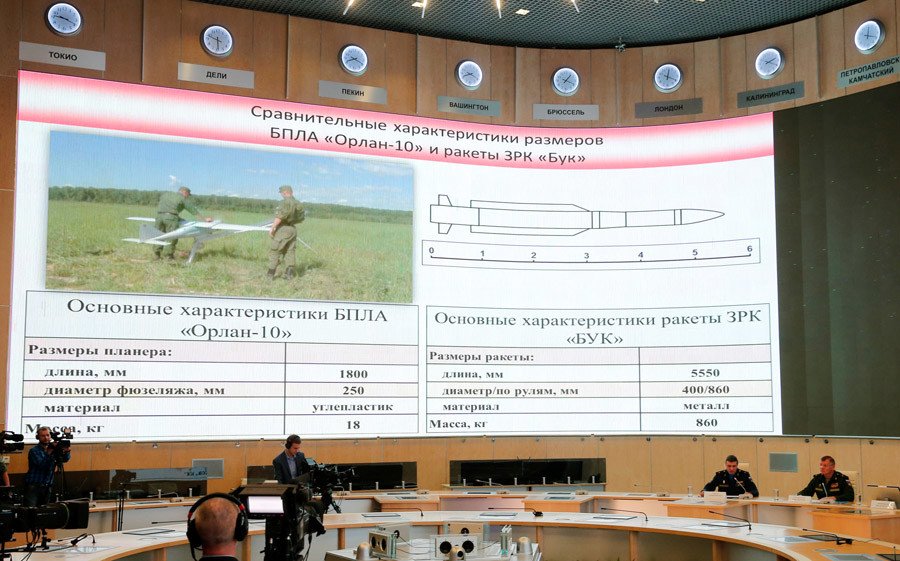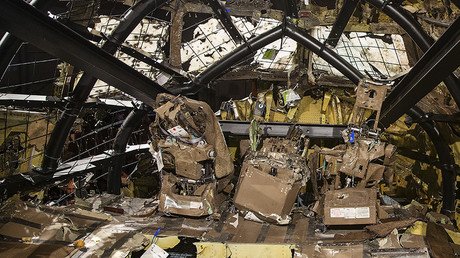Newly discovered raw data picked up by a civilian radar station on the day of the Malaysia Airlines flight MH17 crash shows no signs of a missile being fired at the plane from territory controlled by rebels, the Russian military and radar producer said.
The existence of raw data was announced last week by Almaz-Antey, the producer of the Buk missile system. The system is believed by an international investigation to have caused the 2014 crash over Ukraine.
One of Almaz-Antey’s subsidiaries is the producer of the Utyos-T civilian radar station. One such station is deployed near Ust-Donetsky village in western Russia. According to Almaz-Antey, memory chips from that station were replaced in July 2014, shortly after the tragic incident, and were discovered recently. Until now no raw radar data of the situation around MH17 at the time it was destroyed was thought to exist.
The Lianozovsky Electromechanical Plant, the producer of Utyos-T, presented the raw data on Monday at a media briefing in Moscow. The data showed three civilian aircraft in the vicinity, including the MH17. The one closest to it was flying about 30km from the Malaysian Boeing at the time it was shot down.
“The Ust-Donetsky radar picked up no foreign objects near the Malaysian plane which could have caused its destruction,” said Viktor Meshcheryakov, the company's deputy chief radar designer.
This contradicts the scenario maintained by Kiev, under which a Buk missile could have been fired from the rebel-controlled village of Snezhnoye. The missile could have not been picked up by the radar if it had approached from a direction along the line connecting the radar station and the airliner, Meshcheryakov noted.
Gen. Andrey Koban, the head of the Russian Air Forces' radar troops, said the Russian civilian radar easily located an Orlan-10 surveillance drone circling closer to the Russian-Ukrainian border over Russian territory at the time of the incident. A Buk missile would have been easier to detect than the drone, he said.
The Russian military said Ukraine's refusal to publish its radar data, the positions of air defense batteries it had deployed in the area, and communications between MH17 and the Ukrainian traffic controller directing its flight towards the rebel-held areas in eastern Ukraine, made it look suspicious.
“The Ukrainian side has air situation data in the area of the Malaysian Airlines Boeing 777 crash from both civilian and military sources. The fact that Ukraine has not published radar data leads us to the conjecture that the missile, if it was a Buk, was launched from territory under the control of the Ukrainian military,” the general said.

It resembles the way Ukraine acted in 2001 after shooting down a Russian plane flying from Israel over the Black Sea, a spokesman for the Russian Defense Ministry said during the briefing.
The shooting down of Siberia Airlines Flight 1812 in October 2001 claimed 78 lives, but “despite irrefutable facts that put the blame for the Tu-154 crash on the Ukrainian military, [Kiev] refused to take any responsibility,” Gen. Igor Konashenkov said.
The Malaysia Airlines Flight MH17 tragedy claimed 298 lives and escalated the already-tense crisis in Ukraine, where a coup-imposed government launched a crackdown on rebel forces.
Kiev and its sponsors have accused Russia of supporting the rebels with arms, including the Buk missile which shot down the Boeing. Russia has denied the allegations and says that the evidence which the US claimed to have – such as the satellite images reportedly showing the launch of the missile – was never made public for scrutiny.
The Joint Investigation Team, which is meant to provide court-admissible evidence relating to the MH17 case, is to present the first results of its probe on September 28. Ukraine is part of the team, although Russia is not. Earlier a technical report into the crash confirmed that it was hit by an anti-aircraft missile.

